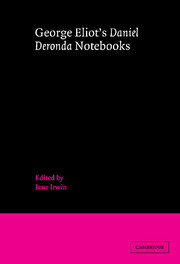PFORZHEIMER NOTEBOOK 710
Published online by Cambridge University Press: 01 June 2011
Summary
Pf710 1 to 41
Sources
GE's major sources for Pf 710 are introduced here, since the format adopted for the Berg Notebook and the other Pforzheimer notebooks – sections of text with introductory headnotes – is inappropriate for this alphabetically arranged notebook. Her notes are identified by their keywords in bold type, as in the edited transcription of Pf 710.
Duncker
Maximilian Wolfgang Duncker. Geschichte des Alterthums. 3rd ed. 4 vols. Berlin: Duncker and Humblot, 1863–76. Volume I, Aegypter und die Volker Westasiens bis aufdie Zeiten des Kyros (550 v. Chr.).
Duncker is the source of notes on Pf 707 63 and 64, copied again here: Anna, Ashtoreth Karnaim, Jubal, Kabirim, Naama, and Tammuz. These refer to religious cults of the Canaanites, including the cults of Baal and Adonis (or Tammuz), and may therefore be related to Kuenen's argument about the polytheism of the Israelites in Canaan, and in particular to GE's note from Kuenen on Ashera. The Egyptian Chronology ‘adopted by Duncker’ on Pf 710 15–16 approximates, but is not exactly equivalent to, that in Chapters 6 and 7. Neither does it conform exactly with the names and dates in the fourth edition of Volume I, published in 1874. It may have been drawn from a secondary source.
Ewald
Georg Heinrich August von Ewald. Hebräische Sprachlehre für Anfänger. 2nd ed. Leipzig: Hahn, 1855.
Of the eight Hebrew grammars and lexicons listed on Pf 710 1, this is the only source of a note: ‘Q'ri and K'tbi, spoken and written. Marginal indications of the masorites'. Its cryptic character (further darkened by a mistranscription of K'tib) may be clarified by reference to Ewald's Introductory Hebrew Grammar, translated by J.
- Type
- Chapter
- Information
- George Eliot's 'Daniel Deronda' Notebooks , pp. 377 - 432Publisher: Cambridge University PressPrint publication year: 1996



